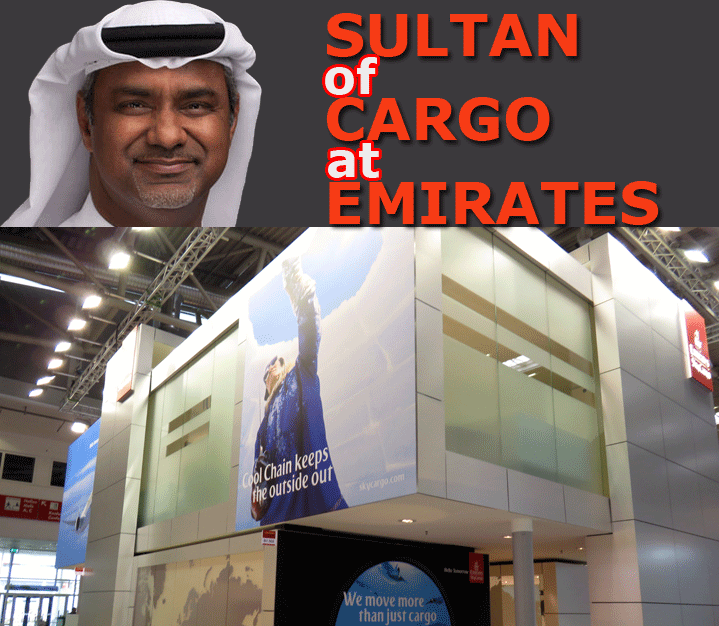
Shortly
after Nabil Sultan emerged on the world stage as Emirates’ “newly
appointed Divisional Senior Vice President, Cargo July 1, 2013,”
he headed to the United States to meet staff and customers. We met up
with him at SkyCargo John F. Kennedy International Airport before that
fateful exercise got underway.
Thinking back on that time, we recall
that the only top air cargo executives we had ever known at Emirates
SkyCargo were Ram Menen and Peter Sedgley, so prior to meeting Nabil
we didn’t know quite what to expect.
At the time, the presser from EK
stated that Nabil was an Emirati educated in the U.S., so our spirits
and expectations were raised about the opportunity to work with a native
UAE person in commercial aviation.
It became clear very quickly as
we spoke with him that he was a man of considerably more grit and substance
than that of a token appointee or someone who was just in the right
place at the right time.
While reserved, quiet, and even
studious, Nabil is also quite the cool customer.
Smart, refined, and always listening
more than speaking, Nabil does not appear to be the least bit intimidated
inhabiting the top spot of the biggest emerging international airline
in the world.
No doubt Ram Menen, who emerged
as a darling and icon of the air cargo industry, was a tough act to
follow.
But by charting his own course and
believing in himself and his team, Nabil has emerged as a force indistinguishable
from SkyCargo itself, as the Dubai air cargo juggernaut continues its
torrid growth in international air commerce.
Directing focus on the product rather
than the man might turn out to be the smartest thing Nabil Sultan could
have done.
But you don’t have to talk
to him very long before Nabil Sultan is telling you through his actions
to “watch what I do.”
Nabil has remained tasked towards
keeping priorities straight, including the well-publicized movement
of the entire 14-freighter fleet to the new Dubai World Central Al Maktoum
International Airport.
We spoke to Nabil Sultan inside
the big, multi-storied Emirates stand at Munich last week. As the clock
ticks steadily toward his second year in the driver’s seat at
SkyCargo, it is clear he is feeling quite comfortable these days, delivering
seamless operations whilst operating between two airports at hub Dubai
operations. He now seems comfortable expanding his interest and involvement
elsewhere.
“Things are going well, markets
have been better in 2015,” Nabil emphasized.
“DWC has been a blessing for
us as we have managed to move some of the capacity out of congested
DXB.
“As cargo continues growing,
we have been able to stabilize our freighter operations at DWC.
“Things look good from an
operations point of view and we are quite pleased,” Nabil said.
“Much of our effort during my first years here has been to both
expand and refine our Dubai hub.
“At both facilities today,
Emirates SkyCargo has the right processes and people in place.
“We were able to greatly strengthen
our team with the addition of Henrik Ambak to the position of senior
vice president, Cargo Operations Worldwide; he joined us from Cargolux
late last year,” Nabil said.
Ambak was a huge “get”
for SkyCargo for his expertise and well earned reputation at Cargolux
directing cargo and ground handling, trucking, standards and procedures,
network delivery, ground safety, ULD management, Customs and e-Business,
as well as IT systems used by the commercial division.
Henrik stepped in less than half
a year ago and is responsible for all Emirates SkyCargo’s hub
operations at Dubai International Airport and Emirates SkyCentral at
Dubai World Central, as well as the operations at more than 140 outstations
across the world.
“Henrik is a great addition
to our team,” Nabil said.
“Emirates continue to expand
both our passenger and freighter operations,” he added.
“We have one more freighter
(B777) aircraft coming in August of this year.
“SkyCargo begins a weekly
freighter service May 27 into Columbus, Ohio, our 48th destination in
the worldwide freighter network and sixth in USA.
“We think Columbus serves
as an ideal alternative point to Chicago where shipments originating
or destined to the mid-west can be trucked much more efficiently,”
Nabil added.
Nabil Sultan says that very little
has surprised him in his experience in air cargo to date.
“There are many areas that
need to be addressed, including processes, information, and innovation,
but the ongoing question is always how do you effectively innovate and
get to where you want to be without any dramatic shifts in quality and
service?
“There are technologies—including
mobile booking, for example—that will make the air cargo business
even more competitive and effective.
“Air cargo has got to be easier
to do business with.
“The world has moved, and
we are doing business at a time when others in IT and elsewhere are
looking into what we do and may challenge us.
“Business wants innovation
in every aspect of the experience so air cargo must lead or will be
forced off the side of the road to tomorrow.”
Geoffrey





